Filter by
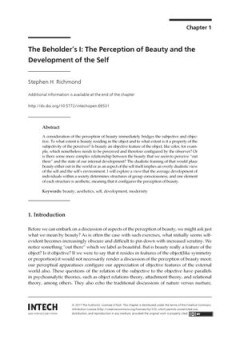
The Beholder’S I The Perception of Beauty and The Development of The Self
A consideration of the perception of beauty immediately bridges the subjective and objective. To what extent is beauty residing in the object and to what extent is it a property of the subjectivity of the perceiver? Is beauty an objective feature of the object, like color, for example, which nonetheless needs to be perceived and therefore configured by the observer? Or is there some more comple…
- Edition
- -
- ISBN/ISSN
- 9789535135814
- Collation
- -
- Series Title
- -
- Call Number
- -
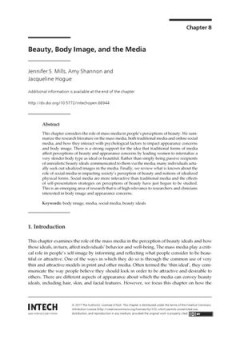
Beauty, Body Image, and the Media
This chapter analyses the role of the mass media in people’s perceptions of beauty. We summarize the research literature on the mass media, both traditional media and online social media, and how they appear to interact with psychological factors to impact appearance concerns and body image disturbances. There is a strong support for the idea that traditional forms of media (e.g. magazines an…
- Edition
- -
- ISBN/ISSN
- 9789535135814
- Collation
- -
- Series Title
- -
- Call Number
- -
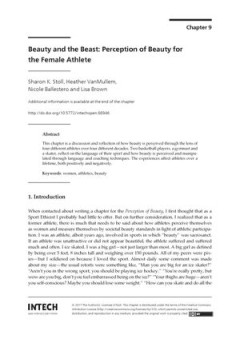
Beauty and The Beast Perception of Beauty For The Female Athlete
This chapter is a discussion and reflection of how beauty is perceived through the lens of four different athletes over four different decades. Two basketball players, a gymnast and a skater, reflect on the language of their sport and how beauty is perceived and manipulated through language and coaching techniques. The experiences affect athletes over a lifetime, both positively and negatively.
- Edition
- -
- ISBN/ISSN
- 9789535135814
- Collation
- -
- Series Title
- -
- Call Number
- -

The Basics of Biogerontology
Aging is an enormously complicated process. Despite a great many of theories (among them “Program Theories”, “Combined Theories”, “Damage Theories”, “Inflamm-Aging”, “Garb-Aging” and the “Rising Deleteriome”), so far there is none which is able to explain this phenomenon satisfactorily and completely. A different approach to address the complexity of aging is to characte…
- Edition
- -
- ISBN/ISSN
- 9781789232523
- Collation
- -
- Series Title
- -
- Call Number
- -
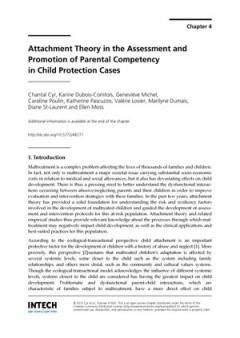
9789535106715 Attachment Theory in the Assessment and Promotion of Parenta…
Attachment Theory in the Assessment and Promotion of Parental Competency in Child Protection Cases
- Edition
- -
- ISBN/ISSN
- 9789535106715
- Collation
- -
- Series Title
- -
- Call Number
- -

Assessment of ADHD Through Electroencephalographic Measures of Functional Con…
The main objective of the chapter is to review the types of electroencephalographic measures of functional connectivity that have been used so far in the study/diagnosis of ADHD. The review will include the methods and results so far reported in the literature as well as those conducted by our research group.
- Edition
- -
- ISBN/ISSN
- 9789535121664
- Collation
- -
- Series Title
- -
- Call Number
- -

The Assassination of Symon Petliura and the Trial of Scholem Schwarzbard 1926…
On 25 May 1926, at approximately 2:15 in the afternoon, on the corner of rue Racine and boulevard Saint-Michel in the Latin Quarter of Paris, a nat-uralized immigrant Jewish watchmaker of Ukrainian origin named Scholem Schwarzbard (1886–1938) shot and killed a prominent emigré Ukrainian journalist, poet, and political leader, Symon Vasylyovych Petliura (1879–…
- Edition
- -
- ISBN/ISSN
- 978-3-666-31027-0
- Collation
- -
- Series Title
- -
- Call Number
- 944 ASS
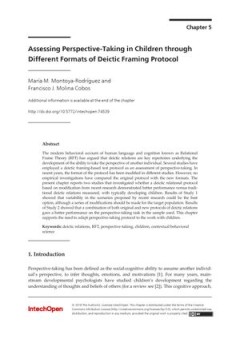
Assessing Perspective-Taking in Children through Different Formats of Deictic…
The modern behavioral account of human language and cognition known as Relational Frame Theory (RFT) has argued that deictic relations are key repertoires underlying the development of the ability to take the perspective of another individual. Several studies have employed a deictic framing-based test protocol as an assessment of perspective-taking. In recent years, the format of the protocol h…
- Edition
- -
- ISBN/ISSN
- 9781789232400
- Collation
- -
- Series Title
- -
- Call Number
- -
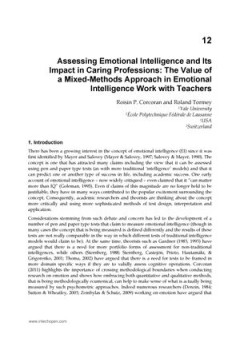
Assessing Emotional intelligence and Its Impact in Caring Professions The Va…
Assessing Emotional Intelligence and Its Impact in Caring Professions: The Value of a Mixed-Methods Approach in Emotional Intelligence Work with Teachers
- Edition
- -
- ISBN/ISSN
- 9789533078380
- Collation
- -
- Series Title
- -
- Call Number
- -

The Assassination of Jacques Lemaigre Dubreuil : A Frenchman Between France a…
This is a political biography of the French industrialist and political activist Jacques Lemaigre Dubreuil (1894-1955), president of the Taxpayers' Federation in the 1930s, entrepreneur in wartime France and Africa, organizer of the 'Group of Five' in Algiers which prepared for the Allied landings in North Africa (November 1942), 'inventor' of General Henri Giraud as a candidate for the leaders…
- Edition
- -
- ISBN/ISSN
- 978-0-415-58946-8
- Collation
- -
- Series Title
- -
- Call Number
- 944 HOI a
 Computer Science, Information & General Works
Computer Science, Information & General Works  Philosophy & Psychology
Philosophy & Psychology  Religion
Religion  Social Sciences
Social Sciences  Language
Language  Pure Science
Pure Science  Applied Sciences
Applied Sciences  Art & Recreation
Art & Recreation  Literature
Literature  History & Geography
History & Geography